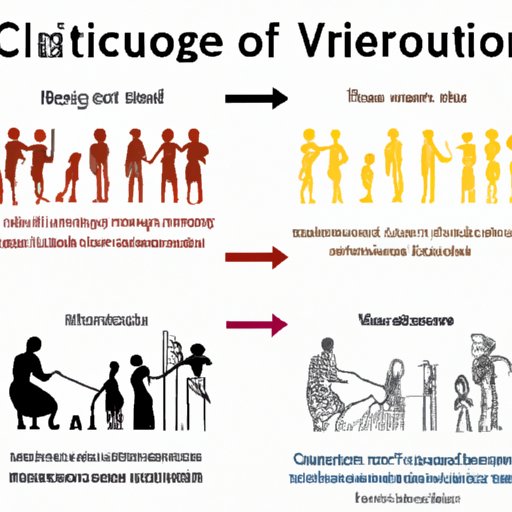Introduction
Culture traits are an important part of understanding how societies function. They refer to the shared beliefs, values, customs, and practices that define a particular group or society. In this article, we will explore the definition of culture traits, examine examples of culture traits, analyze their impact on society, understand how they evolve over time, and investigate how they are passed down from one generation to the next.

Exploring the Definition of Culture Trait
Cultural traits are the shared beliefs, values, customs, and practices that define a particular group or society. These traits can range from language and religious beliefs to dress codes and social customs. Characteristics such as ethnicity, gender, and age also play a role in determining culture traits. It is important to note that culture traits are not static; they are constantly changing and evolving over time.
Culture traits differ from other traits in that they are shared by a large group of people. For example, an individual may have certain traits such as intelligence or athleticism that are unique to them. However, culture traits are shared by an entire community or society, which makes them distinct from other traits.
Examining Examples of Culture Traits
There are many examples of culture traits from different cultures around the world. Some examples include language, religious beliefs, dress codes, social customs, and even food preferences. In the United States, for example, English is the dominant language, Christianity is the majority religion, and jeans and t-shirts are common forms of dress. Other countries and cultures have their own unique culture traits.
In addition to these general culture traits, there are also specific culture traits that are associated with certain groups or societies. For example, the Amish people of Pennsylvania are known for their plain dress code and rejection of modern technology. The Maori people of New Zealand are known for their traditional art forms such as carving and tattooing. Each culture has its own unique set of culture traits that make it distinct from other cultures.
Analyzing the Impact of Culture Traits on Society
Culture traits have both positive and negative impacts on society. On the positive side, culture traits help to unify a society and create a sense of belonging and identity. They also provide a framework for understanding the world and making decisions. On the negative side, culture traits can lead to intolerance and discrimination if they are used to exclude or oppress certain groups.
Culture traits also shape the way societies develop and evolve over time. They influence the political and economic systems of a society, as well as the roles that individuals play within it. By understanding culture traits, we can gain insight into how societies function and how they might change in the future.

Understanding How Culture Traits Evolve Over Time
Culture traits are constantly evolving over time. There are several factors that influence the evolution of culture traits, including technology, globalization, and population changes. As technology advances, culture traits can become more widespread and accepted. Globalization also plays a role in the evolution of culture traits, as different cultures interact and share their beliefs, values, and customs.
Changes in population can also affect culture traits. When new people enter a society, they bring with them new ideas and customs that can alter the existing culture traits. Migration can also cause changes in culture traits, as people take their culture traits with them when they move to different areas.
Examples of changes in culture traits over time can be seen in the United States. The country has become increasingly diverse over the past few decades, leading to changes in language, dress code, social customs, and religious beliefs. This diversity has had both positive and negative impacts on American culture.

Investigating How Culture Traits are Transmitted Across Generations
Culture traits are passed down from one generation to the next through a variety of means. Parents play a key role in passing on culture traits to their children. They teach their children about their culture and pass on their beliefs, values, and customs. Social institutions such as schools and churches also play a role in transmitting culture traits throughout society.
The media and popular culture can also have an influence on how culture traits are transmitted. Movies, television shows, music, and other forms of entertainment can spread culture traits to a wide audience. People often learn about different cultures and their traits through the media and popular culture.
Conclusion
In conclusion, culture traits are an important part of understanding how societies function. They are the shared beliefs, values, customs, and practices that define a particular group or society. We have explored the definition of culture traits, examined examples of culture traits, analyzed their impact on society, understood how they evolve over time, and investigated how they are transmitted across generations. Understanding culture traits can help us gain insight into how societies develop and how they might change in the future.
(Note: Is this article not meeting your expectations? Do you have knowledge or insights to share? Unlock new opportunities and expand your reach by joining our authors team. Click Registration to join us and share your expertise with our readers.)
